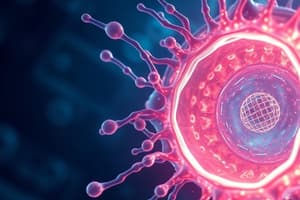Podcast
Questions and Answers
What is the smallest unit that can live on its own and is fundamental to all living organisms?
What is the smallest unit that can live on its own and is fundamental to all living organisms?
- Atom
- Cell (correct)
- Molecule
- Tissue
Which part of the cell is responsible for controlling the substances that enter and exit?
Which part of the cell is responsible for controlling the substances that enter and exit?
- Nucleus
- Cytoplasm
- Ribosome
- Cell membrane (correct)
Which of the following components is NOT one of the three main parts of a cell?
Which of the following components is NOT one of the three main parts of a cell?
- Cytoplasm
- Organelles (correct)
- Nucleus
- Cell membrane
What role does the nucleus of the cell primarily serve?
What role does the nucleus of the cell primarily serve?
Which component interacts directly with the external environment of the cell?
Which component interacts directly with the external environment of the cell?
Flashcards are hidden until you start studying
Study Notes
Cell Basics
- The cell is the smallest unit capable of independent life and constitutes all living organisms and tissues in the body.
- Cells serve as the fundamental building blocks for all biological structures and functions.
Main Parts of a Cell
-
Cell Membrane:
- Encloses the cell's contents and provides structural support.
- Regulates the movement of substances in and out of the cell, maintaining homeostasis.
-
Nucleus:
- Often referred to as the control center of the cell.
- Contains genetic material (DNA) that directs cell activities and heredity.
-
Cytoplasm:
- Jelly-like substance that fills the cell and houses organelles.
- Facilitates the movement of materials around the cell and supports cellular structure.
Studying That Suits You
Use AI to generate personalized quizzes and flashcards to suit your learning preferences.



